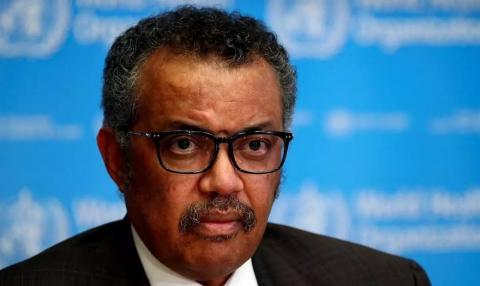
Every year, the International Day of Peace is observed around the world on Sept. 21, as it was recently. The decision by the UN General Assembly to devote a day to “strengthening the ideals of peace” is commendable. Nevertheless, as welcome as the symbolism of marking the day by observing 24 hours of nonviolence and cease-fire is, it reflects a tragic poverty of ambition.
Don’t get me wrong: Every day of non-violence or silenced guns is a cause for celebration, but it does not represent peace. The absence of bloodshed is a noble cause, but a cease-fire is usually just a prelude to further violence. It was not for this that the UN was established.
The founders of the UN were much more ambitious and established from the outset, as articulated in the organization’s charter, a clear objective of maintaining international peace and security through taking “effective collective measures for the prevention and removal of threats to the peace.” The aim was to suppress all manifestations of aggression and ensure that disputes are settled through peaceful means, built on the foundations of justice and equality and respect for human rights.
It has been argued that this was a naive and idealistic response to the horrors of both the First and Second World Wars, and to the failure of an inadequate international system to prevent two gigantic bloodbaths in the space of 20 years. On the contrary, it was a response born of a deep understanding that, if there is anything humanity should have learned from the history of war and conflict, it is that the ambition to prevent and resolve political violence, both domestic and international, does not belong to the realm of the gullible and the dreamers, but is essential to keeping violence at bay.
The UN’s founders also recognized that violence is a trait — some might even argue an intrinsic trait — that exists in both individuals and collectives and was exacerbated by the introduction of the nation state and nationalism. Investing our intellectual and physical resources in preventing and resolving conflicts is aimed at mitigating and compensating for this human shortcoming.
Seventy-five years after the end of the Second World War, peace is far from being the norm. The Uppsala Conflict Data Program has identified 285 distinct armed conflicts since 1946 with differing levels of intensity. Over the last 30 years, these conflicts have claimed more than 2.5 million lives and inflicted countless other forms of suffering, including rape as a weapon of war, horrifying injuries, torture, children forced to become soldiers, summary executions, and the destruction and looting of property.
But we should not ignore the fact that the post-1945 international system has managed to prevent the outbreak of a third world war and, with it, the use of nuclear weapons capable of bringing about the end of humanity as we know it. Moreover, Europe, which for centuries experienced an almost unbroken series of wars and conflicts, is now experiencing an extended period of peace. Those are not achievements that we should take lightly.
However, just because we have not brought the ultimate nuclear calamity upon ourselves or because certain parts of the world are relatively peaceful, this does not mean we should accept that not everyone can enjoy peace. Countering this view requires an understanding of the root causes of violence and why some conflicts persist while others do not. And we must ask ourselves why we have become more comfortable managing conflicts rather than concentrating on preventing and resolving them. Only then can we develop the toolkit for minimizing international conflict.
Accepting that violence, either individual or collective, is part of human behavior does not equate to resorting to a reality in which conflict is unavoidable. Past experiences have demonstrated that most nations, most human groups, and similarly most individuals, are capable of resorting to violence or at least supporting it, under certain political, social and economic conditions. It is actually the acknowledgment and understanding of the nature of our shortcomings and imperfections that will help us develop methods and mechanisms for preventing collective violence, enabling us to nip such outbreaks in the bud before they spiral out of control.
This can only be done once we set ourselves the objective of never settling merely for the absence of violence, and instead make peace the ultimate objective, where the motivation for conflict is also removed. This means painstakingly addressing unresolved areas of contention; not being afraid to tackle the psychological underpinnings of violence; and being brave enough to question the contribution of systems of governance and economic structures to the persistence of wars and other acts of hostility.
This year, the International Day of Peace was observed under very different circumstances, as the world faces an enemy that is normally not associated with wars — a virus. However, this virus is equally as devastating, if not more so, for our societies and economies. It has already claimed the lives of more than a million people, leaving a trail of destruction and disruption with no end in sight.
Although the coronavirus disease has no trained army, no arsenal of sophisticated weapons and no chain of command, it has disrupted the peace and, if it is not handled responsibly, it could become the source of an increased number of destructive conflicts. Battling against this global pandemic might prove to be the making or breaking of a peaceful international system. It could be an exercise in understanding and acknowledging that humanity is better off when it works together with a common sense of purpose and focuses on saving and improving all lives, instead of making things better for some at the expense of others.
We must ask ourselves why we have become more comfortable managing conflicts rather than preventing and resolving them.
Yossi Mekelberg
An international day of peace is an important exercise in focusing global attention, at least for one day, on the horror of wars and conflicts compared with the indisputable benefits of peace. However, peace requires the daily nurturing of all aspects of human activity. It won’t happen just because we desire it, but instead only when a critical mass from all corners of the world and all segments of society finally understands that it is superior to war. Only then can we start building the necessary structures and tools and take measures that might not eliminate violence entirely, but will push it to the margins of humanity. We must never be satisfied with merely managing conflicts; instead we must prevent them and resolve them when prevention fails.
Yossi Mekelberg is professor of international relations at Regent’s University London, where he is head of the International Relations and Social Sciences Program. He is also an associate fellow of the MENA Program at Chatham House. He is a regular contributor to the international written and electronic media. Twitter: @YMekelberg
Disclaimer: Views expressed by writers in this section are their own and do not necessarily reflect Arab News" point-of-view












